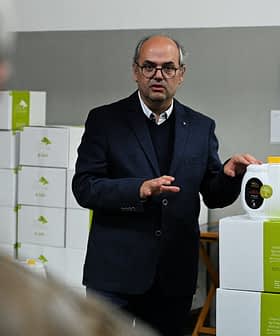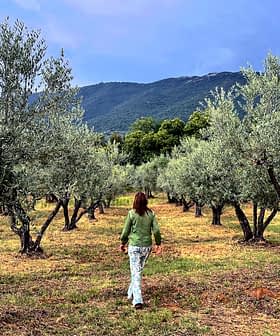Signs of Life from Millenary Olive Tree Burned in Sardinian Wildfires
Volunteers and researchers responsible for restoring the tree warn that more needs to be done to prevent future wildfires.
 Pietro Paolo Arca and Giovanni Galistu (Photo: Franco Spanedda)
Pietro Paolo Arca and Giovanni Galistu (Photo: Franco Spanedda) The thousand-year-old wild olive tree of Sa Tanca Manna in Cuglieri, which was affected by last summer’s fires in west Sardinia, is reviving: three vigorous shoots have sprung out from its stump.
After the general dismay caused by the damage done to the millenary olive tree, which stood 16.5 meters tall with a circumference of 10 meters before the disaster, this event gave everyone new hope.
We think that most of the time, these disasters can be avoided.
“The new sprouts are a sign that the plant is not dead, and we can look forward confidently to a full recovery,” Pietro Paolo Arca, the president of the Montiferru Association, told Olive Oil Times.
The ancient tree’s resurgence was made possible by the work of the association’s volunteers and botanists from the University of Cagliari and the University of Sassari.
See Also:Flames Engulf the Ancient Olive Grove of Amfissa“In the aftermath of the fire, we decided to team up to support farmers and institutions,” Arca said. “We aimed to regenerate the territory, recover the destroyed olive trees and raise public awareness of the importance of immediately taking action to quickly restore the production fabric of the area, to prevent the loss of years of productivity and jobs.”
The group of volunteers called upon other associations and private companies, which responded warmly and made a significant contribution to supplying seedlings to bring the olive and forest resources of the affected area back to life.
After sending a formal request to the municipality of Cuglieri, the Montiferru Association obtained permission to help the local institutions manage the site of the millenary oleaster. Then, following the experts’ recommendations, they started implementing a series of measures to restore the plant’s vitality.
“Upon the remnants of the tree, we placed a sun-shading cloth, namely a covering structure built from scaffolding tubes aiming at replacing the foliage that was destroyed,” Arca said.
This arrangement, in conjunction with a layer of straw mulch, allowed them to lower the temperatures of the soil and the stump, which had reached 90 °C, and bring them back to normal. They also set up a drip irrigation system.
“The researchers from the University of Cagliari found that photosynthetic activity was still taking place in some portions of the stump,” Arca said. “This meant that the plant was not dead. It was a true relief.”
“Therefore, we planned the irrigation every one or two days in those points where the plant was still vital,” he added. “And finally, one day of April, during the Easter holidays, we found the shoots just sprouted from the base.”
They waited some time to communicate the news until the twigs had sufficiently strengthened.
“The millennial structure has obviously been lost,” Arca said. “Yet it is being reborn, and it is a source of real pride for us to have contributed to the recovery of this living monument.”
“The credit goes to the many volunteers who collaborated with the 84 members of our association,” he added. “Still, we can say that the force of nature won over the foolishness of humankind.”
Although it is impossible to irrigate the entire area affected, the association is working to recover all the olive trees impacted by the fire.
Between 60 and 70 percent of the secular plants have responded well and have new sprouts on the trunk or stump. The hope is that a large number of them will recover within three to four years.
“In this case, the risk is the abandonment of the land affected, which is a threat not only for the local economy but also for the protection of the landscape,” Arca said. “Instead, this recovery gives us all renewed confidence.”
On July 23, one year after the wildfire, the Montiferru Association will hold a public event to discuss the restoration of the millenary tree and urge local stakeholders to take the necessary actions to prevent future wildfires, which are forecast to become more severe as a result of climate change.
“We think that most of the time, these disasters can be avoided,” Arca said. “There is a general tendency, in all sectors, to make savings in safety. Instead, it costs much less to invest in prevention than to repair the damage and implement remedial actions afterward. All this should be a warning and a lesson for today’s and tomorrow’s generations.”








